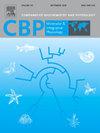Acidification affects the early development of Colombian endemic fish Prochilodus magdalenae
IF 2.2
3区 生物学
Q4 BIOCHEMISTRY & MOLECULAR BIOLOGY
Comparative Biochemistry and Physiology A-Molecular & Integrative Physiology
Pub Date : 2025-05-06
DOI:10.1016/j.cbpa.2025.111875
引用次数: 0
Abstract
There is a significant knowledge gap regarding the acidification of freshwater ecosystems and its effects on biological systems. The bocachico (Prochilodus magdalenae), an endemic and migratory species vital to Colombia's inland fisheries, is currently classified as vulnerable. This study evaluated the impact of different pH levels (6.2, 7.2, and 7.6), previously recorded in the species' natural habitat, on its early development. Using an automated IKS Aquastar system, embryo incubation and larval maintenance were monitored from 0 to 5 days post-fertilization, assessing development, hatching, and survival at both organismal and transcriptional levels. Embryos exposed to pH 6.2 showed delayed development within 4 h post-fertilization, the lowest hatching rate (68.33 ± 3.13 %), and survival (23.88 ± 4.53 %), along with the highest incidence of malformations (37.80 ± 4.4 %). The pH 7.6 group also showed adverse effects, but to a lesser extent. Transcriptome analysis revealed a distinct molecular response in the pH 6.2 group, identifying 1214 differentially expressed genes related to early development, ossification, organ formation, sensory systems, and cellular processes. The findings indicate that pH fluctuations previously observed in the species' natural environment significantly affect P. magdalenae during early life stages, which raises serious concerns about the long-term viability of this endemic species and the sustainability of the artisanal fisheries that depend on it.

酸化影响了哥伦比亚特有鱼的早期发育
关于淡水生态系统的酸化及其对生物系统的影响,存在着重大的知识差距。bocachico (Prochilodus magdalenae)是一种对哥伦比亚内陆渔业至关重要的地方性迁徙物种,目前被列为易危物种。本研究评估了不同pH值(6.2、7.2和7.6)对该物种自然栖息地早期发育的影响。使用IKS Aquastar自动化系统,从受精后0至5天监测胚胎孵化和幼虫维持情况,从生物体和转录水平评估发育、孵化和存活。pH值为6.2的胚胎在受精后4 h内发育迟缓,孵化率最低(68.33±3.13%),存活率最低(23.88±4.53%),畸形发生率最高(37.80±4.4%)。pH 7.6组也有不良反应,但程度较轻。转录组分析显示,在pH 6.2组中存在明显的分子反应,鉴定出1214个与早期发育、骨化、器官形成、感觉系统和细胞过程相关的差异表达基因。研究结果表明,先前在该物种的自然环境中观察到的pH波动在其生命早期阶段显著影响了P. magdalenae,这引起了人们对这一特有物种的长期生存能力和依赖于它的手工渔业的可持续性的严重关切。
本文章由计算机程序翻译,如有差异,请以英文原文为准。
求助全文
约1分钟内获得全文
求助全文
来源期刊
CiteScore
5.00
自引率
4.30%
发文量
155
审稿时长
3 months
期刊介绍:
Part A: Molecular & Integrative Physiology of Comparative Biochemistry and Physiology. This journal covers molecular, cellular, integrative, and ecological physiology. Topics include bioenergetics, circulation, development, excretion, ion regulation, endocrinology, neurobiology, nutrition, respiration, and thermal biology. Study on regulatory mechanisms at any level of organization such as signal transduction and cellular interaction and control of behavior are also published.

 求助内容:
求助内容: 应助结果提醒方式:
应助结果提醒方式:


